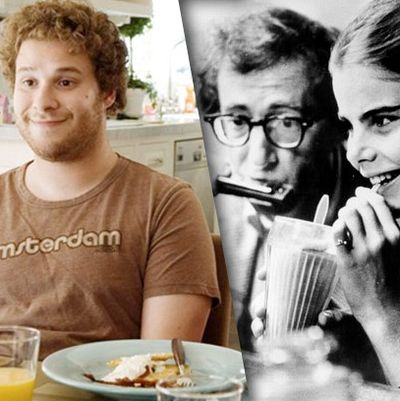
Adulthood is dead, which is great news to get right before the weekend because it means you can cancel your errands and tedious chores and go on a bender, or perhaps just stay home and reread Harry Potter. In a long and thoughtful (and, more specifically, thought-packed) essay in this weekendÔÇÖs New York Times Magazine ÔÇö provocatively titled ÔÇ£The Death of Adulthood in American CultureÔÇØ ÔÇö┬áA.O. Scott lassos everyone from Beyonc├® to Louis C.K. to Don Draper to Broad City to Huck Finn to Lena Dunham to Madonna and hogties them together as an argument that adulthood, culturally speaking, is down for the count.
It all adds up to a satisfying diagnosis of the current cultural moment, even if this particular moment has had an exceptionally long lifespan, cultural-moment-wise. Adam SandlerÔÇÖs Billy Madison, often held up (as in ScottÔÇÖs essay) as the Ur-man-child comedy, came out almost 20 years ago, in 1995. The 40-Year-Old Virgin, the first of Judd ApatowÔÇÖs bro-posse romps, came out in 2005. David Denby, in The New Yorker, identified the post-30, bong-hitting, slacker man-child in a great essay about Knocked Up and romantic comedies back in 2007. And then, of course, thereÔÇÖs this piece of half-assed japery┬áabout a generation of people who are at best reimagining, and at worst scurrying away from, adulthood, from back in 2006. In fact, given that Mad Men premiered in 2007 and Breaking Bad premiered in 2008, you could probably connect these exact same cultural dots to make the case that weÔÇÖre moving toward, and are hungry for, more nuanced depictions of adulthood, rather than hearing adulthoodÔÇÖs death knell at this late hour.
Still ÔÇö┬áas the old Boomer folk song goes, thereÔÇÖs something happening here. It does seem new (or new-ish) that 40-year-olds and 12-year-olds have the same Iggy Azalea singles loaded up on their iPhones; Broad City is really very funny and fresh; and if Judd Apatow didnÔÇÖt exist, cultural critics would have had to invent him. ScottÔÇÖs essay, despite an upbeat ending, is shot through with a sense of loss for ÔǪ something. But if cultural adulthood in America has been on its deathbed (as Scott makes clear) since way back in the days of Mark Twain, what, exactly, are we mourning right now?
Cultural essays about the death of adulthood are often Trojan horses for a different complaint: the death of seriousness. These essays read as modern analogues to the mid-20th-century jeremiads about middlebrow, which were, similarly, taking people to task for not being sophisticated (i.e., adult) enough in their cultural tastes.
In this light, ScottÔÇÖs essay makes an interesting companion piece to the recent review by New Yorker critic James Wood of David MitchellÔÇÖs The Bone Clocks. Wood starts by blithely gesturing to the dimming of ÔÇ£the novelÔÇÖs cultural centralityÔÇØ ÔÇö┬áas though this is an accepted fact, like global warming, and you, dear reader, are the one driving around in a carbon-spewing Hummer made up entirely of copies of Divergent.
Wood then devotes the first section of the review to a lengthy lecture about storytelling (i.e., juvenilia) versus meaning (i.e., mature art) in fiction. ÔÇ£Publishers, readers, booksellers, even critics, acclaim the novel that one can deliciously sink into, forget oneself in, the novel that returns us to the innocence of childhood or the dream of the cartoon ÔǪ What becomes harder to find, and lonelier to defend, is the idea of the novel as ÔÇö in Ford Madox FordÔÇÖs words ÔÇö a ÔÇÿmedium of profoundly serious investigation into the human case.ÔÇÖÔÇØ And there you have it ÔÇö┬áthe S word.
Later, Wood says that MitchellÔÇÖs novel put him in mind of a ÔÇ£terrific little book I enjoyed reading to my son a few years ago, but which I didnÔÇÖt bother to treat as more than a nice bedtime game.ÔÇØ Whereas Scott gamely nods to his own stubborn curmudgeonry ÔÇö┬áending his essay with a lighthearted ÔÇ£Now get off my lawnÔÇØ ÔÇö┬áWood truly does want you to take your Y.A. novels (and your superhero movies, and your comic books, and your bong) and get off his literary lawn. And while youÔÇÖre at it, heÔÇÖs got two choice words for you: Grow up.
The best part of any essay about changing cultural notions of adulthood is that it encourages us, again, to revisit what adulthood means, exactly. To some, itÔÇÖs men in suits and smoking and not being able to do what you want anymore, because propriety. For others, itÔÇÖs a continuing suspicion of cultural pleasure that would make the Puritans proud. To my eye, watching Seth Rogen grapple with responsibility in Knocked Up is a much more honest engagement with the meaning of maturity than watching Woody Allen grapple with a 17 year-old Mariel Hemingway in Manhattan, a presumably more ÔÇ£grown-upÔÇØ film.
But my favorite response to either Scott or WoodÔÇÖs essays starts like this: ÔÇ£For some months past the pages of our more conservative magazines have been crowded with pessimistic descriptions of the younger generation, as seen by their elders and, no doubt, their betters,ÔÇØ and it was written by John F. Carter, in The Atlantic, in 1920. The essay, titled ÔÇ£ÔÇÿThese Wild Young PeopleÔÇÖ by One of Them,ÔÇØ was a response to a long lament about these wild young people ÔÇö┬áhow they, in essence, refuse to grow up. ÔÇ£WeÔÇÖre not babes in the wood,ÔÇØ Carter writes in reply. ÔÇ£ WeÔÇÖre men and women, long before our time, in the flower of our full-blooded youth ÔǪ I suppose that itÔÇÖs too bad that we arenÔÇÖt humble, starry-eyed, shy, respectful innocents, standing reverently at their side for instructions.ÔÇØ What CarterÔÇÖs describing here, of course, is adulthood. And part of being an adult, onscreen or on the page or in life, is developing the confidence to refuse to accept unquestioned a bunch of inherited precepts about cultural seriousness. Really, what could be more grown-up than that?

